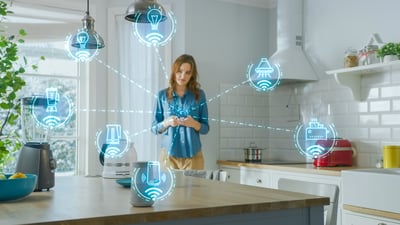
The internet of things (IoT) is booming. It seems as though everything today is either “smart” or has a “smart” version available.
The world of IoT seeks to bring technology into the home to directly improve people’s lives, which requires a distinctly humanistic approach to development. By connecting the things that people interact with daily, technology becomes integrated with consumers’ lives. Considering that the IoT market is predicted to grow to $475 billion by 2020, we’re about to see a lot more “smart” things entering the marketplace. Currently, the security of smart devices is a significant hot-button issue, and one that may affect women more than most as men are able to hack into smart devices to harass or intimidate women.
Despite the fact that women hold only 30 percent of STEM degrees, women can be both skillful engineers as well as empathetic powerhouses who understand both the technical and emotional needs of potential customers.
Objects such as smart watches and computerized cars have been a staple of science fiction and detective stories since the ‘40s. Now smart watches are a common sight, making information that would usually be checked on a phone even easier to access on the go. And most cars have things like GPS, Bluetooth, and handsfree displays as a standard feature, trying to alleviate the danger of using smartphones while driving. In both cases, these objects do so much more than their analog predecessors, opening users to an entirely new world of functionality. Without IoT, these things would not be possible.
The first web page was created by Tim Berners-Lee in 1991, but even before the existence of the internet as we know it people were creating smart objects. For instance, in the early ‘80s, the Carnegie Mellon computer science department customized a Coke machine so that it would display, on departmental computers, how many bottles were in currently in the machine and whether they were cold.
It’s widely considered, however, that the first IoT device (for IoT devices must be connected to the internet) was a toaster created in 1990 by John Romkey that could be turned on and off via the internet. Now, people think internet toasters are the peak of IoT silliness. How quickly we forget.
After the first internet toaster, the IoT industry continued to grow as the internet became more and more widely used. Once it became ubiquitous, devices such as RFID and Bluetooth made it easier to create internet-connected objects such as smart fridges and thermostats. Which brings us to today, where there seems to be a smart version of everything, and surely more to come.
Despite the lack of women in tech overall, there are many women innovating in the IoT space. Women-led startups received only 2 percent of the $85 billion invested by venture capitalists in 2017, and that was a banner year, but there are many women founding IoT startups.
Since IoT encompasses software development, hardware development, product management, commerce, and other entrepreneurial skills, even those without technical backgrounds can enter the IoT space by starting their own companies or building their own hardware.
Like many women in tech, women in IoT are dedicated to creating spaces to uplift other women and provide resources for young women and students looking to enter the IoT space as engineers, developers or entrepreneurs. To celebrate some of these women, and all women in IoT, we’ve compiled a list of women who are making great strides in the industry.
This is by no means an exhaustive list, and we’d love to hear more about the amazing things women are doing in IoT.

Asín is the cofounder and CEO of Libelium, an IoT platform provider that creates hardware to build smart cities. With a background in computer engineering and corporate finance, Asín is focused on IoT solutions for smart cities. Given that most IoT initiatives focus on making things smaller, bringing something micro to something as macro as a city is a huge step forward.

Bdeir is the founder and CEO of littleBits, which produces robotics and engineering toys for children, as well as a TED Fellow and MIT Media Lab alum. With a background in computer and communications engineering. Bdeir is on a mission to inspire kids to be creators, problem-solvers and inventors. By handing children the building blocks for creating their own simple inventions, she is helping create the next generation of IoT engineers and makers.

Chipps is a JavaScript developer and cofounder of Girl Develop It, a nonprofit focused on helping more women become software developers. She is also CEO of Jewelbots, a company working toward increasing the number of girls entering STEM fields using hardware. By encouraging girls to enter the hardware engineering space at a young age, hopefully more women will become interested in creating IoT devices of their own.

An IBM Distinguished Engineer for IBM Watson Internet of Things, DeLuca leads a team called the App Factory that focuses on bringing IoT use cases to market, furthering the industry through innovation. She is also the author of two children’s books that aim to bring technological ideas to children (one teaches children to count to 10 in binary) to help inspire future tech and IoT innovators.
“One of my favorite things about the IoT space, especially in combination with AI, is that it touches everything and everyone, from the home, car and office to a manufacturing line and everywhere in between. IBM recognizes this pervasive potential of IoT and that it’s critical to assemble a diverse group of leaders and innovators who can work behind the scenes to come up with real-life solutions that can meet the needs of everyone. This includes Women. It’s through the collective efforts of a diverse team that we are uncovering the new and often unexpected business value that IoT can bring to all areas of the world around us. At IBM, women are driving many of these incredible innovations and I applaud these women in IoT inside and outside of our company each day.”

Fried is the founder of Adafruit, which seeks to create the best place online for those of all skill levels to learn electronics and develop the best products possible. Hardware engineering is a critical part of IoT innovation, and Fried has become an advocate for women in the space as well as a distinguished engineer herself. A graduate of MIT, she is also the first female engineer to be featured on the cover of WIRED magazine.

Founder of CyPhy Works, a company that creates persistent drones, Greiner also co-founded iRobot Corporation. During her tenure as Chairman and President of iRobot Corporation, the Roomba entered the marketplace and PackBots were delivered to the United States Army as a way to remediate IEDs. Both of these were innovations in the IoT space, the Roomba being one of the most recognizable commercially-available personal robots which has spawned several similar products and made the idea of owning a personal robot commonplace.

Rogers is the founder of Makertorium, a company that produces custom-made physical devices for clients seeking a solution to a commercial problem. She is also an author and a speaker, and holds a Ph.D. in fluid dynamics from Lancaster University. Recently, she founded the Guild of Makers, which seeks to support those who “take pride in creating physical items using their imagination and skills.” The intent is to grow the maker industry and fuel innovation that will inevitably change the IoT space for the better.

Founder and CEO of OpenSensors.io, Stanton builds technology focused on lowering the cost of entry for IoT development, making entering the field more accessible for those without funding or more technical backgrounds. She has also worked as a developer and data scientist, and her goal is to provide people in the IoT industry real-time data about the digital world so they can create using accurate data.

Thorne leads Mozilla’s Open IoT Studio, which is a professional learning network dedicated to making IoT more accessible. She is dedicated to making technology more diverse and inclusive through collaboration. Considering the lack of diversity in tech, Thorne’s work with the Open IoT Studio seeks to shine a light on the work of those who might go unnoticed in the larger IoT space.

A hobbyist maker and hardware enthusiast, Wu creates tech wearables and other open-source objects. She is passionate about encouraging women in Shenzhen, China, to learn about and become involved in tech. Shenzhen is the manufacturing capital of China, and is quickly becoming a hub for tech startups. However, women are still underrepresented in that tech scene, and because Wu is self-taught through internet videos and tutorials, she is passionate about passing on her knowledge the same way.
Brenna Berman, Executive Director of the City Tech Collaborative
Anita Bunk, Head of Digital Engagement and Corporate Communications at Bosch Software Innovations
LinkedIn | Twitter
Natalia Burina, Entrepreneur in Residence at Foundation Capital
LinkedIn | Twitter
Sarah Cooper, GM IoT Solutions at Amazon Web Services
LinkedIn | Twitter
Michelle Curtis, Director, IoT Practice, North America, at Tech Data
LinkedIn | Twitter
Alexandra Deschamps-Sonsino, Founder of designswarm and Good Night Lamp
LinkedIn | Twitter
Tamara Dull, Director of Emerging Technologies at SAS
LinkedIn | Twitter
Jenny Fielding, Managing Director at Techstars
LinkedIn | Twitter
Ros Harvey, Founder and Managing Director at The Yield
LinkedIn | Twitter
Stacey Higginbotham, Founder of Stacy on IoT
LinkedIn | Twitter
Sudha Jamthe, IoT Disruptions CEO and Stanford CSP Instructor for IoT
LinkedIn | Twitter
Carrie MacGillivray, Group Vice President & Global IoT Practice Lead, IDC
LinkedIn | Twitter
Tamara McCleary, CEO of Thulium.co
LinkedIn | Twitter
Sce Pike, CEO and President at IOTAS, Inc.
LinkedIn | Twitter
Claire Rowland, Product/UX Strategy Consultant and Author
LinkedIn | Twitter
Rose Schooler, Corporate Vice President, Internet of Things at Intel
LinkedIn | Twitter
Women of Wearables (WOW) is the first global organization and community that connects women in IoT, wearable tech and AR/VR. Without IoT, wearable tech and AR/VR would not be possible, as they both live at the intersection of the virtual space and reality. The organization’s mission is to encourage women and diverse teams to participate in building hardware and software as designers, product managers or the founders of their own companies.
AnitaB.org finds sponsors to award hundreds of student and faculty scholarships to attend the Grace Hopper Celebration, which is the “world’s largest gathering of women technologists”. This once-in-a-lifetime opportunity allows academics to connect with other women in computing, hear stories from peers and experts in computing, and receive quality career advice specific to their needs.
Society of Women Engineers seeks to empower current and future female engineers through support, education, and events. “For more than six decades, SWE has given women engineers a unique place and voice within the engineering industry. Our organization is centered around a passion for our members’ success and continues to evolve with the challenges and opportunities reflected in today’s exciting engineering and technology specialties.”
The Internet of Things Show with Sudha Jamthe
“Join Sudha Jamthe to imagine a future where everything is connected. Sudha interviews global industry experts on best practices on how Internet of Things (IoT) is being deployed to solve problems and shares her futuristic insights and analysis on the trends and business creation with IoT.”
Women in Hardware: The Interview Series
“Adafruit and Hackster.io, with the generous support of Microsoft, Autodesk, and Qualcomm, have teamed up to present Women in Hardware — an interview series covering some of the most inspiring women pioneering the hardware industry. From groundbreaking entrepreneurs, to engineers at the tops of their fields, we want to highlight the women who are inventing, innovating, and changing hardware for the better.”
IoT Podcast — Internet of Things
“No matter what you call it, we’re at a pivotal moment in the evolution of human creativity, business creation and productivity gains. We could see the gains we make in these next few years help us conserve resources and let us lead safer and healthier lives or we could open the door to a dystopian society where our every thought is monitored and our every utterance is effectively for sale. I hope to explore all of these issues, the people who will make it possible and the devices that will lead us there in the IoT Podcast. I hope you will join me.”
The Peggy Smedley Show Podcast
“The Peggy Smedley Show is the most influential IoT (Internet of Things) podcasts engaging, educating, and entertaining listeners about relevant digital tech trends. Tune in to the live show Tuesday at 12 p.m. CT or listen to podcasts downloadable through iHeartRadio and iTunes.”
Talks by brilliant women in STEM playlist
“These women are trailblazers inspiring a new generation of girls to follow their lead and change the ratio in STEM (science, math, engineering and tech).”
Want to learn more? Find the best IoT analytics software on the market today!
Lauren is a former market research analyst focusing on the e-commerce and retail industries. Since joining G2 in July 2017, she has focused her energy on consumer-driven spaces after spending time in the vertical, design, and CAD software spheres. She graduated from the University of Chicago with a degree in English language and literature and her writing and research has been cited in publications such as Forbes, Eater, and Nasdaq.com, among others. She enjoys building and sharing her knowledge, and in her free time enjoys reading, knitting, and gaming. Her coverage areas include retail technology, e-commerce, and restaurant technology.
Like many other high tech advancements, IoT is at the forefront of innovation.
 by Rebecca Reynoso
by Rebecca Reynoso
Cybercriminals have a wide variety of tools available to them today. One of the most...
 by Yaniv Yagolnitzer
by Yaniv Yagolnitzer
IoT devices allow us to take internet connectivity wherever we go. There are thousands of...
 by Nahla Davies
by Nahla Davies
Like many other high tech advancements, IoT is at the forefront of innovation.
 by Rebecca Reynoso
by Rebecca Reynoso
IoT devices allow us to take internet connectivity wherever we go. There are thousands of...
 by Nahla Davies
by Nahla Davies


